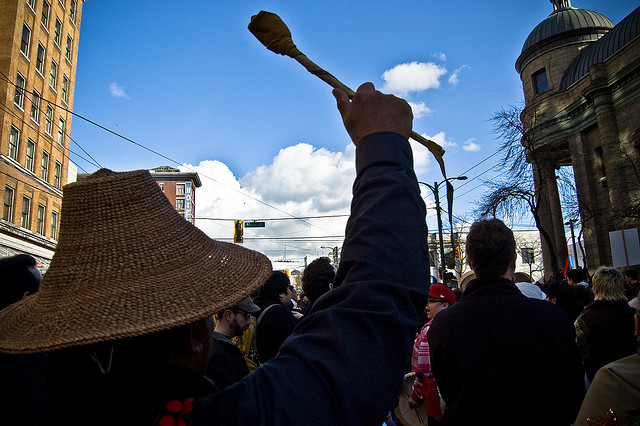Please support our coverage of democratic movements and become a monthly supporter of rabble.ca.
To my Feminist Sisters
This letter, To my Feminist Sisters, is in response to a friend’s observation about how the Canadian feminist movement normally supports causes such as finding the abducted girls in Nigeria, but not the missing and murdered Indigenous women (MMIW) of Canada.
This is partly because of the structural complicity of settler society in the oppression against Indigenous societies in Canada. In the search for justice it is easier to focus more on issues where they feel they are not implicated.
There are two reasons that could explain why citizens who should, do not treat the issue of MMIW with the urgency that it deserves. One is systemic and the other has to do with misplaced understanding of the rights, roles and responsibilities of being a Canadian.
The first and systemic reason is that Canada’s existence arose from and depends on the ongoing dispossession of Indigenous people of their lands. The laws of Canada have been created to guard that dispossession even though there is a mechanism of land claims.
The second reason is the lack of understanding of the role settler Canadians should play in their relation as Treaty partners to the Indigenous.
Both reasons contribute to the disconnection and lack of real empathy for the plight of Indigenous women: rather than fighting for the lives of Indigenous women, settler Canadians make Indigenous women responsible for their own deaths.
The Canadian nation-state’s reliance on the dispossession of Indigenous peoples from their lands creates a structural divide between Indigenous and settler communities. Canadian legal structures are designed so that the Indigenous people must go to Canadian courts to prove their ownership of the lands and resources.
Often, feminists and their families may hope for an outcome against the Native people in a particular case, especially when they feel they have a stake in the land in question. This scenario is played out over and over in Canada.
In my observation and reading many of the editorials, documents and papers, the feminist movement views their gains for equality only from the perspective of gender rights, thus remaining complicit in the further maligning of their Native sisters as they see struggle for land as a means of overcoming their dispossession.
The notions of equality within a colonial setting that is intent on protecting those lands, resources, rights acquired under the archaic colonial concepts — the doctrines of Discovery, Terra Nullius and Manifest Destiny have successfully deceived Canadians, and yes, the Feminist movement of what has happened. Indeed, it has convinced them that whatever has happened is now safely in the past.
The effects of those doctrines continue to influence the laws of Canada and if a Canadian wants to protect what they think is Canadian, then its permissible to work against the legal rights and traditions of Native people. The feminist movement works to improve the Canadian legal system in terms of equality for gender rights, but forgets that the equality they fight for is skewed against Native rights.
Perhaps an overview of Treaty rights and the legal realities that normally accompany Treaties would help to improve the understanding of roles and responsibilities of treaty beneficiaries, which includes my Feminist Sisters and settlers in general.
Sharon Venne, a Cree lawyer provides a great summary of Treaties between the crown and the Indigenous of Turtle island in the following way:
The Proclamation recognized Indigenous Peoples as ‘Nations,’ as distinct societies with their own forms of political organization, with whom treaties had to be negotiated. It also enshrined the protection of Indigenous lands by the British Crown, and a process of seeking Indigenous consent to European settlement through treaty making. Finally, the Royal Proclamation clearly spelled out that Indigenous nations had an inalienable right to their lands.
Sharon H. Venne, “Understanding Treaty 6: An Indigenous Perspective” in M. Asch, ed., Aboriginal and Treaty Rights in Canada (2002)
When one fights for equality and justice, one must take time to ensure that equality and justice is exactly what we are all going to receive.
Fighting for women’s equal rights in a society that is continuously causing injustice against their Native sisters should force feminists to wonder where the line is drawn.
Should it be drawn at the individual gain of the privileged woman or should we find a solution to rectify an ongoing injustice that somehow permits the ongoing atrocities of crimes against Native women and of Native people in general?
By ignoring the responsibilities and roles of all people within the Treaty relationship, Canada as a settler society and indeed the Canadian feminist is permitting the MMIW to continue.
Sincerely,
An Indigenist Sister
Linda Nothing
This is an abridge version of the letter that originally appeared on sassykookum and is reprinted with permission.
Photo: flickr/yaokcool



